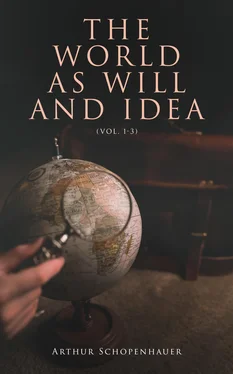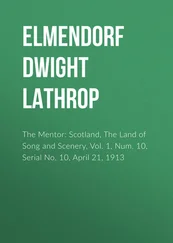If we turn to mathematics to look for the fuller knowledge we desire of the idea of perception, which we have, as yet, only understood generally, merely in its form, we find that mathematics only treats of these ideas so far as they fill time and space, that is, so far as they are quantities. It will tell us with the greatest accuracy the how-many and the how-much; but as this is always merely relative, that is to say, merely a comparison of one idea with others, and a comparison only in the one respect of quantity, this also is not the information we are principally in search of.
Lastly, if we turn to the wide province of natural science, which is divided into many fields, we may, in the first place, make a general division of it into two parts. It is either the description of forms, which I call Morphology , or the explanation of changes, which I call Etiology . The first treats of the permanent forms, the second of the changing matter, according to the laws of its transition from one form to another. The first is the whole extent of what is generally called natural history. It teaches us, especially in the sciences of botany and zoology, the various permanent, organised, and therefore definitely determined forms in the constant change of individuals; and these forms constitute a great part of the content of the idea of perception. In natural history they are classified, separated, united, arranged according to natural and artificial systems, and brought under concepts which make a general view and knowledge of the whole of them possible. Further, an infinitely fine analogy both in the whole and in the parts of these forms, and running through them all (unité de plan), is established, and thus they may be compared to innumerable variations on a theme which is not given. The passage of matter into these forms, that is to say, the origin of individuals, is not a special part of natural science, for every individual springs from its like by generation, which is everywhere equally mysterious, and has as yet evaded definite knowledge. The little that is known on the subject finds its place in physiology, which belongs to that part of natural science I have called etiology. Mineralogy also, especially where it becomes geology, inclines towards etiology, though it principally belongs to morphology. Etiology proper comprehends all those branches of natural science in which the chief concern is the knowledge of cause and effect. The sciences teach how, according to an invariable rule, one condition of matter is necessarily followed by a certain other condition; how one change necessarily conditions and brings about a certain other change; this sort of teaching is called explanation . The principal sciences in this department are mechanics, physics, chemistry, and physiology.
If, however, we surrender ourselves to its teaching, we soon become convinced that etiology cannot afford us the information we chiefly desire, any more than morphology. The latter presents to us innumerable and infinitely varied forms, which are yet related by an unmistakable family likeness. These are for us ideas, and when only treated in this way, they remain always strange to us, and stand before us like hieroglyphics which we do not understand. Etiology, on the other hand, teaches us that, according to the law of cause and effect, this particular condition of matter brings about that other particular condition, and thus it has explained it and performed its part. However, it really does nothing more than indicate the orderly arrangement according to which the states of matter appear in space and time, and teach in all cases what phenomenon must necessarily appear at a particular time in a particular place. It thus determines the position of phenomena in time and space, according to a law whose special content is derived from experience, but whose universal form and necessity is yet known to us independently of experience. But it affords us absolutely no information about the inner nature of any one of these phenomena: this is called a force of nature , and it lies outside the province of causal explanation, which calls the constant uniformity with which manifestations of such a force appear whenever their known conditions are present, a law of nature . But this law of nature, these conditions, and this appearance in a particular place at a particular time, are all that it knows or ever can know. The force itself which manifests itself, the inner nature of the phenomena which appear in accordance with these laws, remains always a secret to it, something entirely strange and unknown in the case of the simplest as well as of the most complex phenomena. For although as yet etiology has most completely achieved its aim in mechanics, and least completely in physiology, still the force on account of which a stone falls to the ground or one body repels another is, in its inner nature, not less strange and mysterious than that which produces the movements and the growth of an animal. The science of mechanics presupposes matter, weight, impenetrability, the possibility of communicating motion by impact, inertia and so forth as ultimate facts, calls them forces of nature, and their necessary and orderly appearance under certain conditions a law of nature. Only after this does its explanation begin, and it consists in indicating truly and with mathematical exactness, how, where and when each force manifests itself, and in referring every phenomenon which presents itself to the operation of one of these forces. Physics, chemistry, and physiology proceed in the same way in their province, only they presuppose more and accomplish less. Consequently the most complete etiological explanation of the whole of nature can never be more than an enumeration of forces which cannot be explained, and a reliable statement of the rule according to which phenomena appear in time and space, succeed, and make way for each other. But the inner nature of the forces which thus appear remains unexplained by such an explanation, which must confine itself to phenomena and their arrangement, because the law which it follows does not extend further. In this respect it may be compared to a section of a piece of marble which shows many veins beside each other, but does not allow us to trace the course of the veins from the interior of the marble to its surface. Or, if I may use an absurd but more striking comparison, the philosophical investigator must always have the same feeling towards the complete etiology of the whole of nature, as a man who, without knowing how, has been brought into a company quite unknown to him, each member of which in turn presents another to him as his friend and cousin, and therefore as quite well known, and yet the man himself, while at each introduction he expresses himself gratified, has always the question on his lips: “But how the deuce do I stand to the whole company?”
Thus we see that, with regard to those phenomena which we know only as our ideas, etiology can never give us the desired information that shall carry us beyond this point. For, after all its explanations, they still remain quite strange to us, as mere ideas whose significance we do not understand. The causal connection merely gives us the rule and the relative order of their appearance in space and time, but affords us no further knowledge of that which so appears. Moreover, the law of causality itself has only validity for ideas, for objects of a definite class, and it has meaning only in so far as it presupposes them. Thus, like these objects themselves, it always exists only in relation to a subject, that is, conditionally; and so it is known just as well if we start from the subject, i.e., a priori, as if we start from the object, i.e., a posteriori. Kant indeed has taught us this.
But what now impels us to inquiry is just that we are not satisfied with knowing that we have ideas, that they are such and such, and that they are connected according to certain laws, the general expression of which is the principle of sufficient reason. We wish to know the significance of these ideas; we ask whether this world is merely idea; in which case it would pass by us like an empty dream or a baseless vision, not worth our notice; or whether it is also something else, something more than idea, and if so, what. Thus much is certain, that this something we seek for must be completely and in its whole nature different from the idea; that the forms and laws of the idea must therefore be completely foreign to it; further, that we cannot arrive at it from the idea under the guidance of the laws which merely combine objects, ideas, among themselves, and which are the forms of the principle of sufficient reason.
Читать дальше












